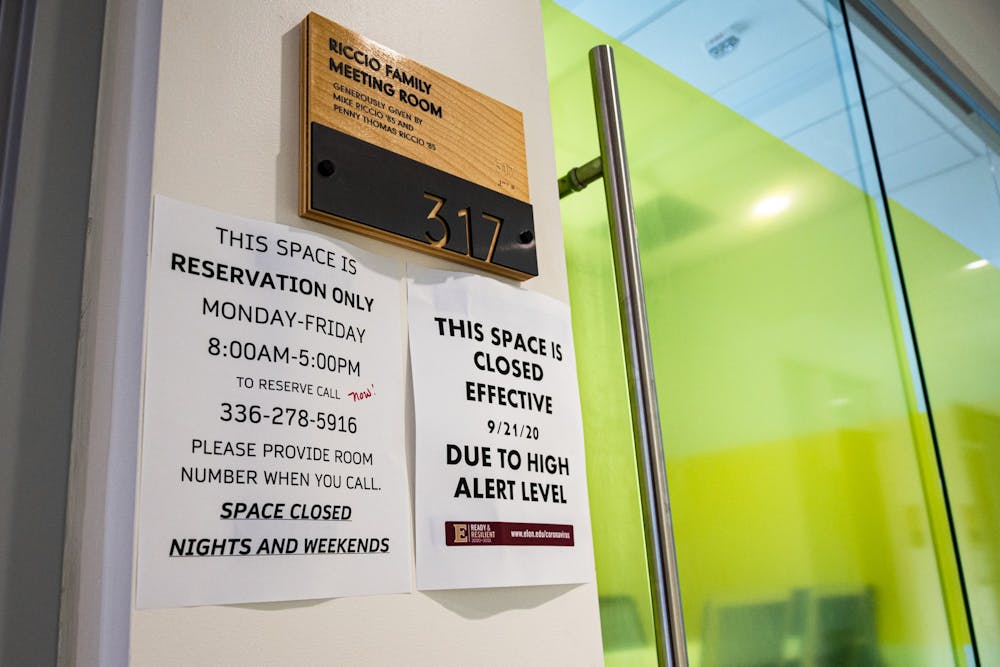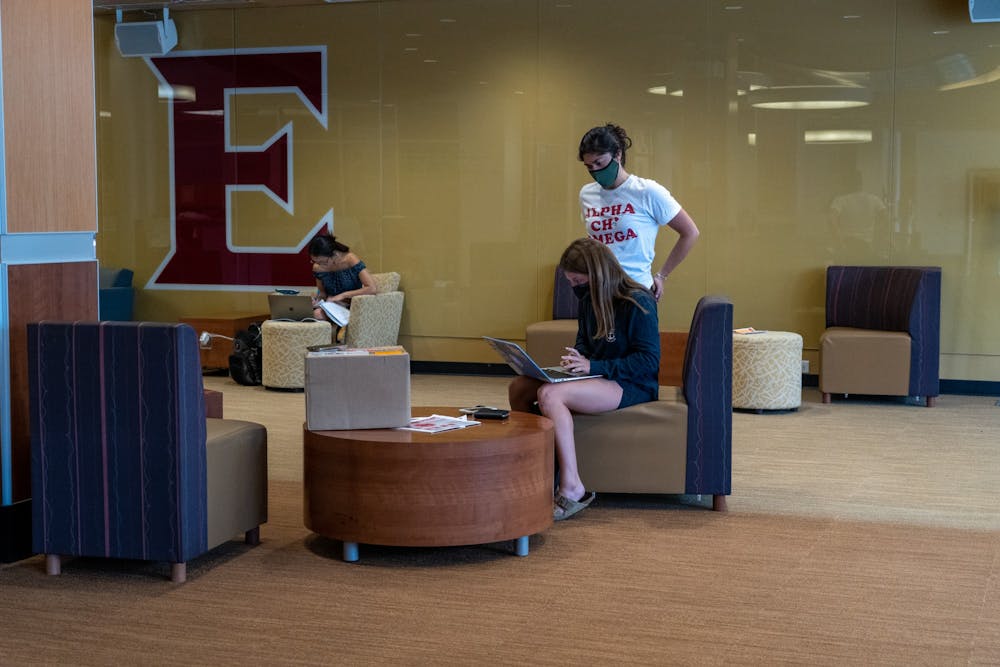Elon University sophomore Stephanie Miljanic already felt constrained by COVID-19 restrictions, but a recent shift in guidelines has made socialization even harder.
Following a recent increase in identified positive COVID-19 cases on campus, Elon University moved to Level 3 — High Alert on Sept. 21, according to an email from Jeff Stein, chair of the Ready & Resilient committee.
In Level 3, the university is advising members of the community to adjust daily activities and limit social interactions to increase safety. Data collected daily from on-campus sources and health providers allows university leaders to set a color-coded status.
According to an email from Stein, the university has implemented a social hiatus — which includes a temporary suspension of visitors to on-campus residence halls — to delay the spread of the virus and attempt to avoid more extreme measures.
Miljanic is a mentor for 30 freshmen on campus and said that many of them have not found close friendships yet.
According to Miljanic, the actions of the university are not socially sustainable and students are struggling with the lack of interaction. Miljanic has the added stress of being immunocompromised, putting her at higher risk than other students. Miljanic felt that students are wondering what the long-term impacts on their interpersonal relations and mental health will be.
Miljanic said the university is not doing enough for their students and that many are struggling.
Elon University freshman Sarah Dodman said she feels safe on campus, but is scared that COVID-19 is worsening among the Elon community.

Dodman said making friends on campus was difficult at first because of university guidelines and regulations to prevent the spread of the coronavirus.
“I was definitely struggling to meet people at the very beginning of the year because of the limitations on how many people [could] be in a group at one time,” Dodman said. “Now I have a steady group of friends and I have even managed to get to know the people in my classes.”
Though she has since managed to find her group of friends, the manner in which students can see each other is changing significantly.
According to Dodman, the social limitations implemented by the university will make it much more difficult for her and other students to have face-to-face interactions with one another.
Miljanic thinks the COVID-19 pandemic affects mental health in general. She feels that the lack of social interaction is not only impacting her but other students as well.
Miljanic said the social hiatus makes it hard to hang out with people and encourages students to congregate in larger groups as the no visitor policy restricts students from going into residence halls other than their own.
“I’m mad at the school because they are not doing enough to keep us safe,” Miljanic said. “The school is saying they are cracking down on things, but they are just trying to cover themselves and [put on] brave faces to the parents and those who are paying.”
According to Stein, colleges experiencing high numbers of cases are asked by state and federal officials to shelter students in place, making the transition to Level 4 — Very High Alert a possibility for the Elon community.
In a letter to community members, Elon University President Connie Book wrote, “people are wondering what happens if we do reach Level 4 — Very High Alert. If that happens, our current plans are to shelter the campus in place for two weeks, go to remote classes during that period, then test again for an all-clear before reopening.”
Miljanic said that quarantining in a dorm room for two weeks is not a way to live. Miljanic thinks it could be more beneficial for everyone on each floor to quarantine together, rather than isolating everyone.
“It’s almost like prison,” Miljanic said. “If the school is locking students in, it would be better to group them with others.”
Miljanic also believes that students should all be tested before the decision to go into a two-week quarantine is finalized, as she thinks the lack of social interaction that comes with isolation would be damaging to students mentally.
“Personally, I need to be around people,” Miljanic said. “Locking me in my room without social interactions will be detrimental to my mental health.”
Although Miljanic believes that a two-week quarantine would be harmful to the mental health of students, she does not think the university should send students home, as it would risk infecting parents and families.
Dodman said that she is a physically active person and the possibility of going into a two-week quarantine frightens her.
“If we have to stay in the same place for two weeks, it would be hard for me to be cooped up for so long,” Dodman said. “I love interacting with other people, and it is something that makes me happy. I’m concerned that I won’t have enough social interaction with others and it will change my mood.”
Dodman said she is also worried that a possible lockdown would have a negative effect on her grades.
“I enjoy learning in person rather than online because it can be harder to focus and do well,” Dodman said. “If we go into a two-week quarantine, my classes would have to transition to online and that may prove to be difficult for me.”
Miljanic feels that the possibility of Elon shifting to Level 4 would have a negative impact on students’ mental health as well as their overall academic success.
“I do not think locking us in our own bedrooms is a great idea,” Miljanic said. “I think the university needs to take better steps to keep us safe before they imprison us in our dorms.”


